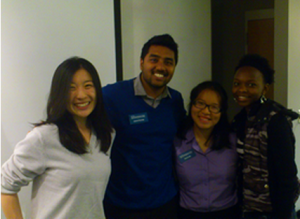By Safwan Haque | UTS Staff Writer | SQ Online (2013-14)
If you are planning to go to professional school or get a job in the biological sciences, proving your abilities to a selection or admissions committee is key to your success. You can definitely do this through your personal statement, CV, and your interview — but what shows your personal character? This is where the letter of recommendation becomes a vital component of your application.

BSSA recently held a seminar covering important aspects of procuring a good letter of recommendation. It starts with the purpose of the letter of recommendation. “It allows for professionals who know you well to recommend you for your qualities and characteristics and your ability to perform tasks,” said Grace Lee, a Career Services Center official.
[hr]
Some key tips on obtaining a letter of recommendation are summarized below:
Who to ask
Any faculty member who has taught you or a faculty member you assisted as a teaching assistant are possible letter writers. You can also ask your job/internship supervisors or professional mentors (doctors you have shadowed, your post doc, etc). If you are unable to acquire a letter from a professor or mentor, you may ask a class TA who has a Master’s or Doctorate degree.
Getting to know them
This is the part that requires the most effort. Visiting them during office hours is the most recommended method. Once you know them, you can invite them to your college’s “Dine With a Prof” or “Coffee With a Prof” program. You can also start organizations or be in mentor programs such as those provided through the Health and Medical Professions Preparation Program, where you can have professors as advisors or mentors. Finally, you can meet them through your research experience or honors classes where class sizes are small allowing for close faculty contact.
How to ask
You should ask in person but send an email to arrange a meeting. In addition, be sure to provide your information such as transcripts, personal statements, and papers you wrote in class, like good lab reports. Also include a list of your activities by using help from the Career Services Center, and officer positions in clubs and events you organized. You must tell them your expectations in writing the letter, such as Association of American Medical Colleges guidelines. Keep them updated about deadlines. This is essential since they might be busy and forget. Also tell them your method of collecting the letters – through mail, uploading on a web-based program or personal pick up. When meeting them you must ask: “Are you comfortable writing a strong and positive letter of recommendation for me?”
When to ask
Ideally you should ask 5-6 weeks before your application deadline and ask in person so you can better demonstrate your emotions and sincerity. Be clear to your recommender about deadlines and send appropriate reminders. If you are taking a year off you should definitely ask before you graduate. Be able to update the recommender on your activities over the year and stay in touch with them during this time.
Collecting letters
A great website to use is Interfolio.com which is an electronic application collection service. You may use similar services but this service is the most recommended by the Career Services Center officials. Once the letter writer has completed and submitted the letter, drop off a thank you letter in person. Most importantly, update them on results of the application.
[hr]
If you would like additional resources, visit Express Advising at the Career Services Center or the Career Services Center Library.
Now that you have these tips, you can start preparing by writing or updating a resume as your first steps. Attend office hours of professors you want to ask, or think about Dine With a Prof or Coffee With a Prof. If you already received a letter and have not done so already, make sure to send a thank you letter. So don’t be scared; just start connecting and do it gracefully by being yourself.